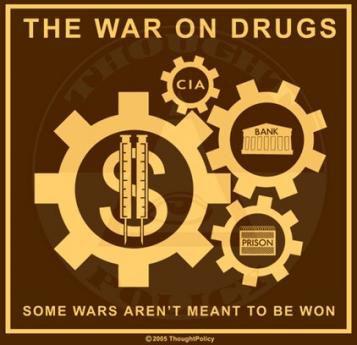One of the longest wars ever on record, the war on drugs has gone on for over 40 years. Were this an armed war it would have been resolved long ago and despite the tragic loss of life the tactics and warfare have remained the same. The drug war rages on, prisons continue to be over crowded, crime continues to rise and people continue to suffer as a consequence of this failed battle. There are questions we need to ask, is this battle lost, can it really be won and is it time for a truce. One of these questions is easily answered, and the evidence is glaringly obvious. Yes, the battle has been lost, year after year the situation has worsened and the approach by the state remains the same. Can it be won, probably not entirely, but to a certain extent through adopting different methods it can be effectively challenged. Is it time for a truce, in a sense- yes. Evidence shows that decriminalization has proven effective in other countries; this could be the truce America needs to truly address the drugs epidemic.
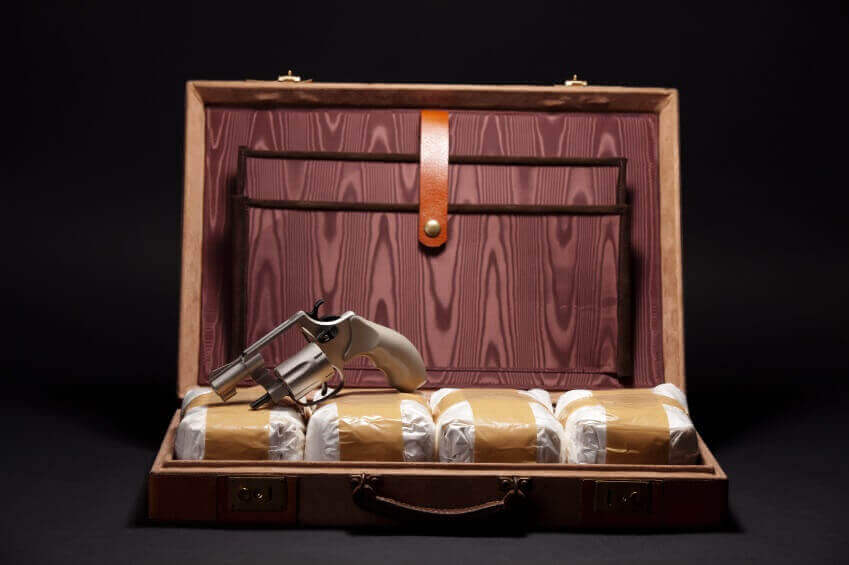
A History
The most notable and well known declaration of war on drugs was in 1971 by President Nixon. However the war on drugs has been informally on-going for over a century. Drugs initially surfaced in the United States in the 1800’s but it wasn’t until the turn of the century that there was a realization of the dangers of drugs, and the need to regulate them and enforce laws to deter use and prevent addiction. The first federal drug law policy enacted in America was the Harrison Narcotics Act in 1914. It restricted the manufacture and sale of marijuana, cocaine, heroin and morphine.
The 1930’s was also a significant period in the war on drugs. Harry Anslinger the first US Drug Czar declared “relentless warfare” on drugs and his hard line stance was on-going throughout his time as Commissioner of the Treasury Board under the Federal Bureau of Narcotics from 1930-1962. Prohibition was the method used and this informed the style of Anslinger’s approach throughout his term. He despised opiates most and from his hate of heroin grew an equally intense dislike of marijuana. His extreme approach went on to enact a law that permitted the death penalty in some cases that involved the sale of opiates to minors. Tougher sentences were also applied to possession of any drugs that derived from opium and also marijuana. With stringent regulations, harsh sentencing and zero tolerance for use and possession you would assume that the drugs epidemic would be reduced. Unfortunately this was not the case and the illegal drug trade raged on. It can be put down to the simple principle of supply and demand and demand was never as high as in the 1960’s when drugs became socially acceptable, popular and somewhat normal.
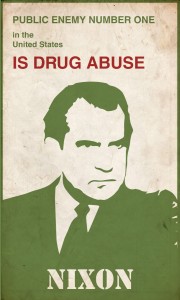
While the 1960s are associated with marijuana, peace, love and hippies, it was also a time when there was a huge heroin habit in the country. It is not surprising then that it was in 1971 after a decade of addiction, drug trafficking and criminal activity that Nixon officially declared a war on drugs. The initiation of the drugs war actually began in 1969 when Operation Intercept was launched. This operation intended to stop marijuana from entering the U.S from Mexico. It led to the shutdown of the U.S- Mexico border for a two week period, subjecting all passing vehicles to intense inspections. Interestingly no major shipments were ceased. The next step in the process was the passing of the Comprehensive Drug Abuse Prevention and Control Act. In this Act penalties for possession of marijuana were decreased but law enforcement had an increase in power regarding drug related searches.
1972 Press Conference- President Nixon talk investment in the War on Drugs
The historical hard-line approach was the method adopted by the State and despite the evidence and research supporting decriminalization, Nixon as with others would not back down. He referred to drugs at the time as “public enemy number one”. In 1972 the same year the war was signed into law, the Commission made a unanimous recommendation to decriminalize the possession and distribution of marijuana for personal use. Nixon rejected their recommendation and continued with prohibition and criminalization.
Having signed the war on drugs into U.S law in 28th January 1972 Nixon was quoted as saying “I am convinced that the only way to fight this menace is by attacking it on many fronts.” Despite the President’s declaration, some states did not follow his lead and marijuana was decriminalized in 11 states from 1973-1977. It was this stance that presidential candidate Jimmy Carter adopted and under his administration, an amount of marijuana of up to one ounce for personal use was decriminalized nationally.
This boded well for Ronald Regan, elected in 1981 he was entering the presidency at a time when the drugs issue was still raging and the most recent tactic of decriminalization was fresh in the public’s mind. He campaigned for zero tolerance policies and referred to the drugs issue as a matter of national security. It was easy to blame the perceived leniency on the ineffective reduction of the drug trade. Public concern continued to grow due to intensive media coverage of drugs, addiction and the latest narcotic- crack cocaine. The media’s influence is evident as a poll taken in 1985 shows 2-6% of Americans saw it as a major problem but by 1989 this figure was a staggering 64%. Once the media got tired and moved on to another story the figure returned to less than 10%. Regan’s legacy remained securely stamped in the prison system however; his term in office saw a massive increase in incarcerations with the introduction of mandatory sentencing. The number of people in prison for nonviolent drug offenses was at 50,000 in 1980 and after Reagan and his successors Bush and Clinton it had risen to an insane 400,000 by 1997.
In 1991-2002 the federal budget allocated to fighting the war on drugs went from $4.6 billion to $9.5 billion. Efforts and ammunition were increased, more and more funds were allocated but little was being achieved. While harsh enforcement laws have been common over the decades, more comprehensive methods were attempted throughout the 1990’s and 2000’s. This occurred with a realization that addiction was a genuine issue and had severe, lasting consequences. Funding began to be allocated to drug treatment programs as well as educational programs and media campaigns. The policies of the 2000’s attempted a more balanced approach to the drugs issue, however in reality the focus did continue to remain on enforcement. When Obama became president he was clear that drug enforcement policy would be similar to that used in the past but that the term War on Drugs would no longer be used. The administration adopted a five prong approach featuring prevention, treatment and support. Again despite this declaration the reality has seen Obama’s administration provide extensive funding to enforcement policy, in comparison to minimal funding for treatment orientated policy. Changes in tactics are evident, with the 2000’s being an era adopting progressive, preventative, educational, treatment focused policy not seen since this battle began. Did a revision of the tactics and a change in the approach actually see victories in this so-called war?
What’s been achieved?
“I am a very strong believer that the path we have taken in the United States in the so-called war on drugs has been so heavy in emphasizing incarceration that it has been counterproductive,” he said. “You have young people who did not engage in violence who get very long penalties, who get placed in prison and then are rendered economically unemployable, are almost pushed into the underground economy, learn crime more effectively in prison — families are devastated. So it’s been very unproductive.”- Barack Obama
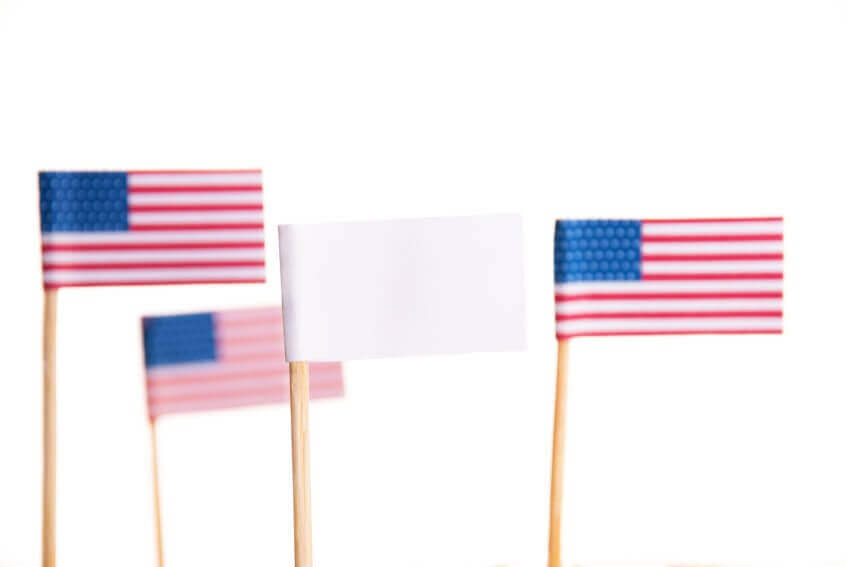 There are many ways in which we can argue the ineffectiveness of this war; on practically every front is has failed. The only potential achievements that can be plucked from the rubble are the addicts who have gone through state funded treatment programs and become sober. Addicts who have availed of programs voluntarily or involuntarily, but who have either way become fully functioning members of society. These are lives saved, but sadly the casualties of the drugs war far outweigh them. Unfortunately this highly aggressive decades long battle has seen few positive results in the drugs situation in America. After decades of drug use, abuse, addiction, crime and incarceration the wider public have come to not alone tolerate, but accept the drugs problem here in the U.S. It may seem harsh to say nothing has been achieved and that there are no results to be seen, however the facts show that the United States has the highest rate of consumption of drugs in the world despite the investment made in trying to tackle this. Spending to address the problem is now at a colossal $40 billion per year; our prisons are packed to the roof tops with 600,000 people in jail. Over criminalization is leading to small time users being picked up, processed and prosecuted, while the big time dealers, suppliers and cartels stay on the streets. U.S prisons are being needlessly filled with the wrong people through this incessant need to criminalize drugs.
There are many ways in which we can argue the ineffectiveness of this war; on practically every front is has failed. The only potential achievements that can be plucked from the rubble are the addicts who have gone through state funded treatment programs and become sober. Addicts who have availed of programs voluntarily or involuntarily, but who have either way become fully functioning members of society. These are lives saved, but sadly the casualties of the drugs war far outweigh them. Unfortunately this highly aggressive decades long battle has seen few positive results in the drugs situation in America. After decades of drug use, abuse, addiction, crime and incarceration the wider public have come to not alone tolerate, but accept the drugs problem here in the U.S. It may seem harsh to say nothing has been achieved and that there are no results to be seen, however the facts show that the United States has the highest rate of consumption of drugs in the world despite the investment made in trying to tackle this. Spending to address the problem is now at a colossal $40 billion per year; our prisons are packed to the roof tops with 600,000 people in jail. Over criminalization is leading to small time users being picked up, processed and prosecuted, while the big time dealers, suppliers and cartels stay on the streets. U.S prisons are being needlessly filled with the wrong people through this incessant need to criminalize drugs.
Does this mean the war is over, does this mean that it is time to surrender; is surrender the only way that the war on drugs can really be won? The reality is that drugs are a global issue and not unique to the U.S; a report from the United Nations shows that the drugs business is the third biggest in the world after oil and arms, with a value of £198 billion per year. With an industry this lucrative and mega bucks to be made, can we really believe that drugs will be eradicated from society? The fact is that drugs are a social issue and addressing the problem needs to happen in our society not in our courts. Were there no demand for drugs, the need for supply and the potential for huge profits would not exist. Policy attacks supply head on every time, if equal consideration was given to the reasons for demand we may be a little further along. With all of this in mind, is it time to have a serious conversation about the decriminalization of drugs in America.
Decriminalization- The Alternative
Drug decriminalization calls for reduced control and penalties compared to existing laws. Proponents of drug decriminalization generally support the use of fines or other punishments to replace prison terms and often propose systems whereby illegal drug users who are caught would be fined, but would not receive a permanent criminal record as a result. A central feature of drug decriminalization is the concept of harm reduction.
We have gone through decades of prohibition and criminalization of drugs and we can see that a century later the problem has actually worsened. An alternative is available, a new approach is staring us in the face and it has proven to be effective in other countries. Decriminalization is being embraced internationally from Uruguay to Portugal, Jamaica and the Czech Republic. Some states in America have relaxed their laws also, particularly regards to marijuana use. The drug has been legalized in four U.S states with several others preparing to follow suit.
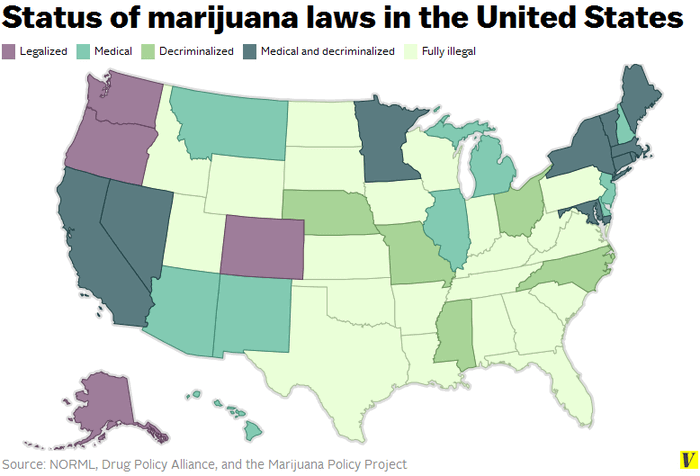
We know that prohibition has not worked so why not try something different; could it make things any worse? There is a fear with respect to decriminalization; this fear in light of experiences from other countries has proven to be irrational. Those who fear it believe it will lead to an increase in drug use and abuse, leading to an addiction epidemic. There are fears that crime will rise without harsh punishments as a deterrent, and basically that a drug induced madness will grip the nation.
In reality decriminalization has the potential to be extremely beneficial to the Nation and can serve to play a major role in addressing its drugs problem. The introduction of decriminalization nationally can reduce overcrowding in our prisons, it can reduce violence on our streets, it can reduce harm to addicts and users through the regulation of quality and pricing. It can eliminate the black market and organised crime, it can reduce corruption.
A clip examining what happened when Portugal decriminalized drugs
Portugal fought a war much like ours but after nearly 30 years they realized they were losing. In 2001 the government adopted a completely reversed approach and introduced decriminalization. It didn’t just decriminalize marijuana but all recreational drugs. Over 14 years later statistics show a decrease of half in the amount of people using drugs in the country. It now has 3 overdose deaths per million people in comparison to the EU average of 17.3. As previously referred to in this piece the reason for demand must be addressed in effectively tackling the drugs problem. In Portugal’s experience social scientists believe that it is not alone decriminalization that has led to a reduction in drug use. Over the same time period drug control was moved from the Justice Department to the Ministry of Health. Within this new model a comprehensive public health model was implemented in order to effectively treat drug addiction. The country’s welfare system was also expanded to include a guaranteed minimum income. Instead of working with 100,000 criminals, Portugal is now working to treat 40,000 drug users.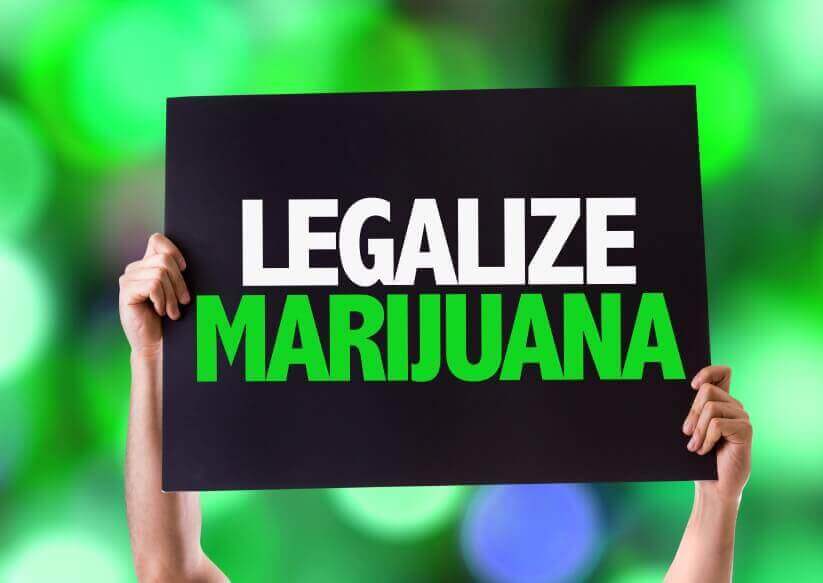
This is significant as it is essential that decriminalization is not introduced in isolation, but that a comprehensive approach offering prevention, treatment and support is adopted. In addition to this there needs to be a transfer of resources; the money previously spent on jailing users must be reallocated to supporting them, offering treatment and education to reconnect them with society. This once considered dangerous experiment has proven successful and the facts have quietened sceptics. Portugal is not the only country to reform its drugs policy, 25 other countries have moved away from punitive drug laws over the past decade. With a notable global shift in drugs policies, is it time for the leader in the War on Drugs to call a truce. All the evidence points to yes, but will America heed the evidence, only time will tell.
